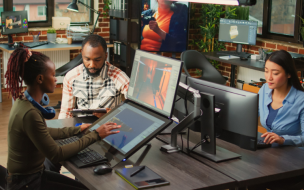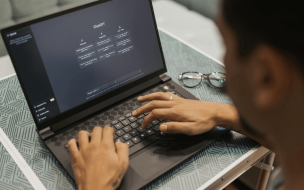Like every technological shift, this change brings uncertainty. Many functions look poised to be drastically changed, reduced, or even replaced by AI. Some particular areas where changes are expected are in customer service, proofreading, and bookkeeping.
However, studies indicate that employers are yet to begin treating AI knowledge as a priority when it comes to recruitment.
So, what impact will AI have on MBA jobs? Are the career paths most suited to MBAs going to be shut off or rerouted? Or, as the World Economic Forum predicts, will the new technology create more avenues than it closes?
We spoke to AI experts at several top business schools, including Dartmouth College's Tuck School of Business, The Wharton School, and Carnegie Mellon University's Tepper School of Business to find out how AI will affect MBA jobs. Here’s what they said.
Artificial Intelligence Jobs: How Will MBAs Be Affected?
Managerial roles will change
The MBA degree is designed to prepare students for roles in middle management and higher. With this in mind, MBAs are insulated from some of the immediate changes AI is making.
“Right now, we anticipate that AI will have the biggest impact on early career and entry-level roles that our students will oversee in more managerial positions,” says Joe Hall, senior associate dean for teaching and learning at the Tuck School of Business at Dartmouth.
However, this does mean that managers must know how to manage changes in subordinates’ roles and understand how AI tools work.
“While AI may not have a massive effect on Tuck MBAs’ day-to-day lives just yet, they undoubtedly need to understand how this technology works and why it has such great potential,” says Joe.
To prepare students, the Tuck school has introduced a slate of new courses focused on AI, including a module specifically addressing AI for managers.
AI will become a new decision-support tool
Where AI will make a direct impact on MBA jobs is as a managerial tool.
Eric Bradlow, vice dean of AI and analytics at Wharton, says: “AI will clearly create jobs that require workers, managers, and the C-suite to use AI as a decision support tool."
“That is, there will need to be workers who know how to utilize AI, bring AI to their organization, lead in a world of AI, train people in AI, and so on. In addition, a number of new industries will arise because of AI.”
MBA grads will need to know how to use AI to support decision-making by using it to quickly verify or aggregate data, spot trends, or assess risks.
The Wharton School hasn’t wasted any time in preparing students with these AI skills, Eric adds.
“We are providing ChatGPT licenses to all MBA students. We will be providing training courses in AI. We have AI Hack-a-thons which reward the best student ideas in AI. We have experiential learning projects that allow students to apply AI to real companies.”
The school also recently launched the Wharton AI & Analytics Initiative to harness AI for four groups: industry, researchers, students, and society at large.
MBAs’ value will be in higher-level thinking
So far, we’ve seen that AI will change the roles that MBAs manage and provide a useful tool for helping them do so. It will also, crucially, accentuate the value of their human skills.
“What we can say with a degree of certainty is that in any future jobs we will shift, where appropriate, to a collaboration between workers and AI,” says Laurence Ales, professor of economics and GenAI fellow at the Tepper School’s Center for Intelligent Business.
“Beyond knowledge of how to interact with AI, this shift will also require workers to be comfortable with higher-level thinking: workers should be able to understand the problems and be able to formulate the right questions more than executing routine tasks to reach the answer.”
This type of critical thinking is an essential skill in an AI-enabled workplace—and one that business schools are well-equipped to provide.
“At the Tepper school we recognize that decision-making requires a framework to understand problems,” says Laurence.
“Our program helps students build actionable frameworks in all of the functional areas of business. The strategic, analytical, and leadership skills of our MBA students will be crucial in navigating AI-driven transformations and driving business growth.”
How Will AI Change The Big Three MBA Industries?
Most MBA graduates go into one of three industries after their degree: consulting, finance, or technology. At Wharton, for example, over 86% of the most recent class took up roles in one of these three industries.
How will each of these industries be impacted by AI? Here’s our snapshot.
AI in consulting
AI is unlikely to replace human consultants, for many of the same reasons that it will not replace human managers across industries. Current AI models cannot replace the combination of creativity and strategic thinking offered by human consultants.
However, AI’s potential as a decision support tool comes in especially handy in consulting, for example, fast-tracking data analysis and automating other tasks.
If you’re an aspiring MBA consultant, look out for MBA programs that address the need for AI skills in consulting, like the program at Dartmouth Tuck.
“Many Tuck students enter the consulting field after graduation and we recognized a need for a course specifically about AI’s impact on consulting,” says Joe Hall.
“So, we introduced AI and Consultative Decision-Making, which serves as a hands-on laboratory to give students experience using generative AI in an advisory and decision-making capacity.”
AI in finance
AI will likely make sweeping changes in financial services—again, mainly as a decision-support tool. Its likely functions include:
⇨ Making transaction processing faster
⇨ Automating fraud detection
⇨ Analyzing asset performance
⇨ Assessing risk for insurance purposes
It can even help on the compliance side of finance by quickly analyzing complex regulations and legal texts.
AI in technology
AI will make broad changes in the tech industry, chiefly as a streamlining tool. One example is in software development, where AI can test and even generate new code.
It also has big implications for cybersecurity. An AI arms race is emerging between cyber attackers, who may use AI to create relentless and constantly-evolving threats, and cyber defenders, who can use the technology to create evolving defenses.
As such, there may be fruitful opportunities for MBAs with interests in cybersecurity and AI to pioneer in this field.

Most MBA jobs are somewhat protected from replacement by artificial intelligence by being management-focused. Humans’ creativity and strategic thinking skills are still irreplaceable.
However, that doesn’t mean that MBAs can ignore the impact of AI, or put off learning about it. To exercise irreplaceable higher-order thinking skills and manage in the world of artificial intelligence, MBAs should learn how to apply AI tools to decision-making and keep abreast of technological developments.
Additionally, MBAs may have opportunities to forge careers on the frontlines of new industries or sectors—for instance, managing cybersecurity in the age of AI.

© Jopwell on Pexels, reproduced under this license








